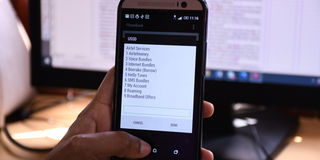Is your mobile phone safe?

A subscriber uses a smartphone. Some fraudsters persuade users to handover or enter PIN numbers, which are then used to enable fraudulent transactions. PHOTO/Rachel Mabala
What you need to know:
There are increased cases of mobile money scammers who dupe unsuspecting Ugandans by hacking into their mobile money accounts. Racheal Nabisubi expounds on the tricks mobile fraudsters use to defraud you.
There are rising incidences of fraudsters taking advantage of unsuspecting Ugandans through mobile phones. Many people have lost money to fraudsters on their mobile handsets and the trend seems to persist. They can attempt more than once or twice to defraud people of their money. But what tricks are used and which safety measures can be taken to curb the vice of defrauding people through their mobile phones?
The spokesperson of the Directorate of Criminal Investigations Department (CID) of Police Mr Charles Twine on NTV the Link explains how fraudsters target you on the mobile phone.
Below are the excerpts. Common ways used to defraud people.
Mr Twine says fraudsters are always innovating new ways on how to defraud people.
He defines fraud as any act deliberately done by a person with deception for criminal intention of getting financial gains.
“It is orchestrated by criminals using different fashions. Every time they come up with new innovations aimed at defrauding Ugandans or other unsuspecting people of their money,” Mr Twine says.
Telephoning
Using telephones, for instance, where you receive a message on your phone and it is followed by a phone call.
Somebody will call you instructing you to put particular codes into your phone often pretending to be working for telecom companies.
“Unknowingly or out of curiosity or ignorance, some Ugandans send the codes as instructed by the caller. The next time you realise, your money is taken off from your mobile money account or sometimes you get a notification from your bank that your account has been debited of such an amount of money unknowing that the codes you sent were manipulated by this caller,” Mr Atwine explains.
Codes
This is done with a high level of technology where fraudsters manipulate servers of different aggregators.
Fraudsters can send you secret codes on your phone either designed in form of letters or numbers. As soon as the codes are inserted into the phone; they access all details on your phone from the server.
He notes that from the experience of dealing with such crimes, some of them are either highly trained Information Technology experts or former employees of telecom companies which gives them access to their system.
“These fraudsters have or might have had access to the different systems. This results during the time that they were working within the system where they had a chance to make some modifications that the company might not be aware of,” Mr Atwine says.
He adds that at times when employees leave, the company does not do a system overhaul which they take advantage of and create a network of fraudsters.
System vendors
Others might be associated with the system vendors (the people who install the system). These live some proxies which they use to manipulate the system, connect other fraudsters with whom money is shared.
Negligence
These fraudsters do a Google search about you and where you work. Without due diligence, you send some money to this person that you are not familiar with.
Citing an example where someone gives you a call pretending to be at the Airport having your gift from Netherlands aligning it to a famous company such as Nic or Adidas and you do not question it because of your love for gifts.
Due to negligence, they will call notifying you that the Airport needs to clear the gift at a fee of about Shs150,000. Later, they say Uganda Revenue Authority has intercepted it and they need Shs30,000; totalling to Shs180,000. The same is being done to over one million people which means over 1 million people could succumb.
Improperly registered simcard
Fraudsters use improperly registered simcard. This issue arises during registration where a network system is apparently unavailable hence utilising the chance to defraud you. They tell you to wait for the network to come back yet they have taken your fingerprints and data.
When you leave a ‘registration point’, they sell the line to another person using your biography.
Digital media influence
He notes that some people have become victims because they have subscribed and liked some ‘unauthorised’ pages. They do not verify these pages before liking them.
“Quite often you are googling to find a notification ‘accept cookies’ and you adhere to it. This compromises your particulars and data because those cookies will be used to manipulate your system and the next time, your money will be gone,” he says.
Phone cloning
There is also an issue of phone cloning, a software that is bought online.
“This is why it has become a challenge for the police to detect and curtail. It is bought online by fraudsters and the moment they have bought that software; they know your phone, ring you and verify,” he adds, noting that after verifying your phone is off for a minute or two or an hour depending on how busy you are to verify your phone. This can easily be detected early if you have the capacity to do so.
He further explains that this business of accepting every cookie will result into your phone being cloned and the money taken away.
Financing fraud cases
Often times’ people are defrauded and approach trackers to help them track their money. But some trackers are crooks.
“Once you go to police and somebody offers to track for you, first verify from the officer-in-charge of criminal investigations (OC CID) and the District police commander (DPC), they will know a genuine tracker,” he elunotes.




